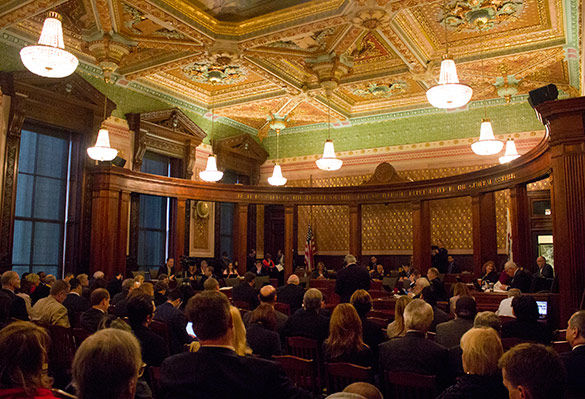Rank-and-file Illinois lawmakers talking income tax hike

May 12, 2016
A group of rank-and-file lawmakers is suggesting an Illinois income tax increase to help bring in $5.4 billion along with $2.5 billion in cuts as a starting point for talks on passing a long-elusive state budget by month’s end.
Before taxpayers go scrambling for their wallets, however, know this: The budget blueprint so far has not been accompanied by the kind of pro-business, union-weakening changes that Republican Gov. Bruce Rauner has demanded be part of the mix. And Democratic Speaker Michael Madigan remains opposed to tying the governor’s agenda to approval of a budget.
But inside a Capitol stuck in the rut of a record-breaking 11-month impasse, many in the state’s political class eagerly welcome any emerging wrinkle, especially given that the budget framework talks were led by Rauner budget director Tim Nuding.
Advertisement
“There was no agreement in the sense that everybody said, ‘Yeah, I can sign onto things as is,'” said Rep. Barbara Flynn Currie, a Chicago Democrat and top deputy to Madigan. “So there’s lots of internal discussions still to be had, but the idea is here’s a framework, and it was enough of a framework for Nuding to feel comfortable taking it to the governor.”
Republicans were less inclined to describe the proposal as a framework for an agreement, noting there has yet to be movement on the governor’s proposed changes to how workers are compensated for injuries on the job, a property tax freeze and giving local governments the ability to limit collective bargaining for union workers.
“These are ideas we asked members to put together on what could possibly go into the budget, and we’re looking at it and we’re going to continue to absorb it over the weekend, regroup next week and see where things are at,” said House Republican leader Jim Durkin of Western Springs. “But part of it is also a lot of reforms that are part and parcel of a budget discussion.
Added Republican Rep. Tom Demmer of Dixon, “We know that these things are going to be negotiated up to the last minute. There’s still a lot of opportunity for leaders, for rank-and-file members to have input into it. We presented a starting point and put a lot of work into it, but it’s not done. It’s not a final proposal.”
Under the budget proposal legislators sent to leadership for review late Wednesday, the state would bring in roughly $5.4 billion in new revenue through a combination of tax increases. That includes raising the personal income tax rate from 3.75 percent to as much as 4.85 percent, expanding the sales tax to certain services and eliminating some corporate tax breaks.
Meanwhile, spending would be cut by roughly $2.5 billion. That includes a reduction in health care spending for the poor, saving $750 million in pension costs by ending late-career salary spikes and requiring schools and universities to pick up employee pension costs above a $180,000 yearly salary, along with unspecified changes in how the state buys goods and services.
In addition, the state would no longer be required to pay back $450 million it borrowed from special funds last year to plug a separate budget hole.
Advertisement*
The state would also seek to borrow $5 billion to pay down a backlog of bills expected to hit $10 billion by July 1.
Also outstanding is a solution to the current budget year, in which more than 90 percent of government operations have been paid for through various laws and court orders, but big-ticket items like higher education, prisons and social services have only been partially funded or not funded at all.
Rauner was cagey when asked Thursday about the progress of negotiations.
“I’m cheering for the bipartisan General Assembly members to come up with some solutions,” Rauner said after touring an early childhood education center in Springfield. “And I’m eager to see what they’re recommending.”
But Rauner remained focused on distancing himself from the talks, and indicated that the two sides were still far from a final deal.
“I don’t want to get in front of any specific idea yet, or comment, because it’s a little dangerous to take one proposal out of context. This is going to be a grand, fairly fulsome compromise,” Rauner said. “And virtually, we’ll know we’re at a good place where everybody involved is not particularly happy with the outcome but they are happy with certain elements of the outcome. Because that’s the political process, that’s the definition of a grand bargain.”
With less than three weeks until scheduled adjournment May 31, Madigan is not talking grand bargain.
“My goal for the remainder of the session is to continue to do budget-making without reference to changes in collective bargaining, workers’ comp, prevailing wage,” Madigan told WICS Newschannel 20 in Springfield this week. “And my further goal is not to agree with the governor to use the government to bring down the wages and the standard of living of middle class families, to send injured workers to the emergency room or to welfare or to continue to hurt the vulnerable in our society. Those are my goals.”
The state last raised the income tax in January 2011, from 3 percent to 5 percent. But that rate fell to 3.75 percent in January 2015. Then the Rauner-Madigan budget stalemate unfolded in the ensuing months.
___
(c)2016 the Chicago Tribune
Visit the Chicago Tribune at www.chicagotribune.com
Distributed by Tribune Content Agency, LLC.
Advertisement







